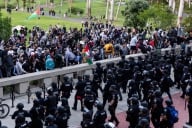You have /5 articles left.
Sign up for a free account or log in.
A program promising free digital textbooks to Florida’s college students has won early supporters, but it’s also sure to worry faculty who fiercely guard the right to select their own course materials.
The University Press of Florida, partnering with a state-supported digital library called The Orange Grove, is building an online catalog that the two groups hope will dramatically ease the cost burden on students purchasing textbooks. In addition to allowing students to download textbooks in the digital library for free, the system will also permit them to order a custom printed copy of any book for no more than half the cost of the traditionally printed edition.
The library, which now features fewer than 100 titles, includes only those materials licensed through Creative Commons, a nonprofit organization that allows authors to grant copyright permission to their works. The textbooks may have been created as open source documents from the start, or they could be books that were once released by a commercial publisher that has ceased printing editions. Under preexisting agreements, authors will collect royalties only for the printed editions of their work -- not the downloaded copies.
While the library features 89 titles now, the five-year goal is to supply textbooks suitable for all of the general education courses offered in Florida’s colleges and universities. There is no discussion of mandating that professors use the library’s textbooks, although organizers are already brainstorming ways to make the library more appealing. Meredith Morris-Babb, director at the University Press of Florida, said additional grant funding could help broaden the selection -- and perhaps there are other lures available. Might department chairs offer perks to faculty who used the library?
“We understand this is a cultural shift, and faculty just don’t change that fast,” Morris-Babb said. “And what we want as part of our funding is to incentivize faculty to make that shift.”
As appealing as reduced textbook costs sound, there are potential red flags for faculty members, according to Jack Mecholsky, chair of the University of Florida’s Faculty Senate. If the state amasses a library of free books selected without faculty input, it may be only a matter of time before some lawmaker with a populist streak tries to mandate that faculty assign only those books in their classes, Mecholsky said.
“That’s the danger, and I could see that happening,” said Mecholsky, a professor of materials science and engineering. “What happens [when lawmakers intrude] is they have just made an academic decision that that textbook is right for all professors and all students taking that course, and that’s wrong.”
“It sounds so good the way they present it,” he added, “but then you say what are the unintended consequences? And they don’t think about that at all. We’re constantly fighting things like that.”
Mecholsky still sees potential positives coming out of the project, however. One of the aims of the library is to allow professors to weave together chapters from several different textbooks, helping them build customized coursepacks at low or no cost to students.
“That would be very attractive, I think, to many, many professors," he said. "Because a lot of times they borrow information from different texts."
Supporters of projects like the one in Florida say it represents the wave of the future, and there are plenty of examples of other institutions using digital textbooks and print-on-demand technology. The University of Texas at Austin announced a pilot program last year that would shift certain classes completely to e-textbooks, and the University System of Ohio gave professors incentives to help create free materials for the system’s most commonly taught courses.
Supporters See Acceptance Growing
So how can a program like Florida’s ensure quality? Organizers of the project say they have no intention of entering into licensing agreements with commercial publishers, so that leaves a library largely populated by out-of-print books and those that were created with the intention of free online distribution.
Dave Dawson, an instructor of engineering and computer technology at the University of West Florida, says any concerns about quality are rooted in an outmoded way of thinking. There’s a growing acceptance that good scholarship doesn’t require a large commercial publisher’s name below its title, Dawson said.
“I think that university institutions as a whole are coming to recognize that they have to begin to recognize digital content creation as a legitimate form of academic pursuit,” said Dawson, who serves on a task force advising Florida’s book project.
Acceptance of digital works in the scholarly community is sure to grow when a more formalized peer review process spreads across the digital world, and that’s already happening, Dawson added.
A digital library like the one Florida is building doesn't have to be just for textbooks. Indeed, there are many common materials used by professors -- particularly in general education courses, Dawson said. Dawson regularly contributes screen animations and other graphical tools to The Orange Grove, placing the materials in a digital warehouse that students and faculty members can use in their own classes. That kind of sharing of material is increasingly commonplace, and only stands to benefit higher education, Dawson said.
“People are just used to distributing content in a collaborative atmosphere, and there’s much more of that happening,” he said. “And now it’s becoming an integral part of the way people do things.”








